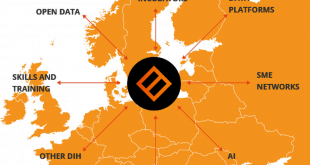The original version of this article (in French) was published in the quarterly newsletter no. 20 (March 2021) of the Values and Policies of Personal Information (VP-IP) Chair. On 25 November 2020, the European Commission published its proposal for the European data governance regulation, the Data Governance Act (DGA) which aims to “unlock the economic and societal potential of data and technologies like artificial intelligence “. The …
Read More »Search Results for: digital uses
DMS Logistics is optimizing inland container transportation
The inland container logistics chain suffers from low digitization, which limits organization and communication between the various parts of the chain. To overcome this problem, the start-up DMS Logistics, incubated at Mines Saint-Étienne, is developing a platform to optimize management of these flows of goods. It uses machine learning methods to automate the creation of schedules, reduce congestion at terminals …
Read More »Covid-19: what could subsurface wave detection mean for the pandemic?
The detection of SARS-CoV-2 viral infections responsible for Covid-19 allows us to monitor the evolution of the pandemic. Most methods are based on individual patient screening, with the disadvantages of cost and time. Other approaches based on the detection of SARS-CoV-2 in urban wastewater have been developed to monitor the trends in infections. Miguel Lopez-Ferber, a researcher at IMT Mines Alès, …
Read More »SONATA: an approach to make data sound better
Telecommunications must transport data at an ever-faster pace to meet the needs of current technologies. But this data can be voluminous and difficult to transport at times. Communication channels are congested and transmission limits are reached quickly. Marios Kountouris, a telecommunications researcher at EURECOM, has recently received ERC funding to launch his SONATA project. It aims to shift the paradigm for processing …
Read More »Reconnecting data to the sensory world of human beings: a challenge for industry 4.0 already taken up by SMEs
Gérard Dubey, Institut Mines-Télécom Business School and Anne-Cécile Lafeuillade, Conservatoire national des arts et métiers (CNAM) Given the magnitude of uncertainty and risk of disruption threatening the economic and social order, the digitization of productive activities is often presented as a panacea. Whether it’s a question of industrial production, creating new jobs or reclaiming lost productivity, the narrative supporting industry …
Read More »Facial recognition: what legal protection exists?
Over the past decade, the use of facial recognition has developed rapidly for both security and convenience purposes. This biometrics-based technology is used for everything from video surveillance to border controls and unlocking digital devices. This type of data is highly sensitive and is subject to specific legal framework. Claire Levallois-Barth, a legal researcher at Télécom Paris and coordinator of …
Read More »Power-to-gas, when hydrogen electrifies research
Hydrogen is presented as an energy vector of the future. In a power-to-gas system, it serves as an intermediary for the transformation of electricity into synthetic methane. The success of this energy solution depends heavily on its production cost, so IMT researchers are working on optimizing the different processes for a more competitive power-to-gas solution. Increasing production of renewable energy and reducing …
Read More »Data and AI: fostering innovation at European level
EuHubs4data, a project funded by the European Union, seeks to make a big contribution to the growth of European SMEs, start-ups and web-based companies in the global data economy. How? By providing them with a European catalogue of data-driven solutions and services in an effort to foster innovation in this field. The project was launched on 1 September 2020 and …
Read More »Managing electronic waste: a global problem
Responsibilities surrounding digital waste are multi-faceted. On one side, it is governments’ responsibility to establish tighter border controls to better manage the flow of waste and make sure that it is not transferred to developing countries. On the other side, electronic device manufacturers must take accountability for their position by facilitating end-of-life management of their products. And consumers must be …
Read More »Agricultural sediments transported by rivers
The QuASPEr project studied the Canche river basin in northern France to better understand the phenomenon of soil erosion and its related consequences. This knowledge aims to develop effective land management methods for municipalities without negatively affecting farmers’ work. Heavy rain, dry land, sloping ground that has been tilled… and the soil erodes. This phenomenon of abrasion, in particular …
Read More » I'MTech L'actualité scientifique et technologique de l'IMT
I'MTech L'actualité scientifique et technologique de l'IMT









